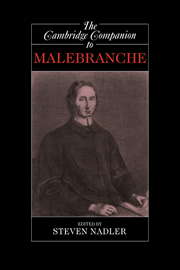Book contents
- Frontmatter
- Introduction
- 1 Malebranche and Method
- 2 Malebranche on the Soul
- 3 Malebranche on Ideas and the Vision in God
- 4 The Malebranche-Arnauld Debate
- 5 Malebranche on Causation
- 6 Metaphysics and Philosophy
- 7 Malebranche's Theodicy
- 8 Malebranche on Human Freedom
- 9 Malebranche's Moral Philosophy
- 10 The Critical Reception of Malebranche, from His Own Time to the End of the Eighteenth Century
- 11 Malebranche's Life and Legacy
- Bibliography
- Index
5 - Malebranche on Causation
Published online by Cambridge University Press: 28 May 2006
- Frontmatter
- Introduction
- 1 Malebranche and Method
- 2 Malebranche on the Soul
- 3 Malebranche on Ideas and the Vision in God
- 4 The Malebranche-Arnauld Debate
- 5 Malebranche on Causation
- 6 Metaphysics and Philosophy
- 7 Malebranche's Theodicy
- 8 Malebranche on Human Freedom
- 9 Malebranche's Moral Philosophy
- 10 The Critical Reception of Malebranche, from His Own Time to the End of the Eighteenth Century
- 11 Malebranche's Life and Legacy
- Bibliography
- Index
Summary
Questions about the nature of causality occupy a rather central place in early modern philosophy. There had been, of course, a concern with causality in ancient philosophy (especially Aristotle) and in medieval thought (particularly in the sacramental context). However, the topic took on even greater urgency in the seventeenth century. In large measure, this was due to a problem specific to the period: how to reconcile an emerging scientific view of the natural world - mechanistic physics - with traditional and still-compelling beliefs about the relationship between God and his creation. On the one hand, natural philosophers of the period saw their task as one of identifying the underlying causal structures of observed phenomena and of framing explanations in terms of matter and motion alone. On the other hand, it was generally recognized that an omnipotent God is responsible not just for creating the world and its contents, but also for sustaining them in existence. Against this background, in which philosophy, physics, and theology merge, the problem of causation arises in several contexts: (1) in the realm of purely physical inquiry (How does one body produce changes in another body?); (2) in regard to relations between the mind and the body (Are mental events true causes of physical states of affairs, and do bodily states cause effects in the mind?); and (3) in philosophical inquiry into the mind alone (Are there real causal relations among thoughts and other mental activities? Does the mind cause its own states of being?) In all three contexts, the answers to these specific questions hang upon the answer to the more general question as to how God's omnipotence and role in sustaining things in being can be reconciled with granting creatures true causal efficacy.
- Type
- Chapter
- Information
- The Cambridge Companion to Malebranche , pp. 112 - 138Publisher: Cambridge University PressPrint publication year: 2000
- 12
- Cited by

